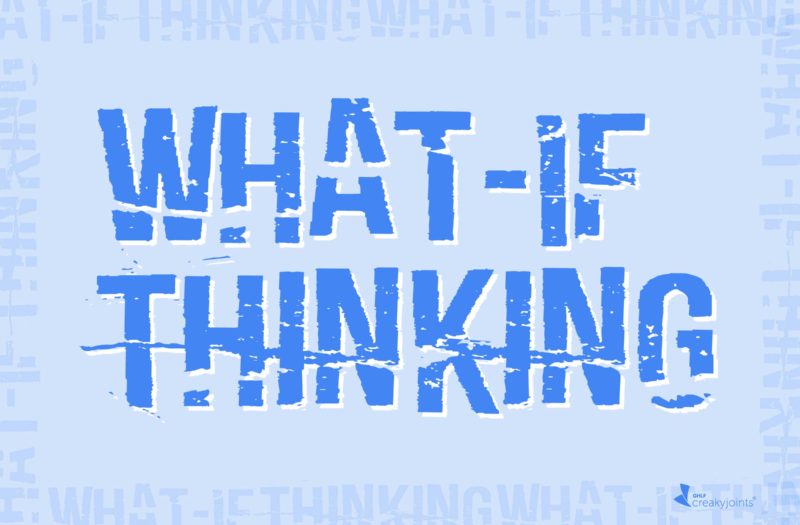Learn more about our FREE COVID-19 Patient Support Program for chronic illness patients and their loved ones.
Yesterday one of my clients was creating a story. It was a very scary story about “what-ifs” — what if this happens, and then what if that happens, and then I will be sicker, poorer, out of work, lose my apartment. She was spinning out of control because of her story — and rehearsing this imaginary story was hurting her.
I gently interrupted and shared something from a book I had just discovered.
“Decline worst-scenario thinking.”
The author Jen Gotch wrote a memoir titled The Upside of Being Down. She gives this advice: “Understand that your fear-based thoughts are not necessarily true. If they’re leading you to a possible future event that isn’t here, you don’t have to follow.”
She continues, “Think of your mind as a roommate. When I hear mine heading to those scary places, I talk to it like it’s the person I want to leave the room. I’ll say, ‘Thank you. I’m fine right now. I don’t need to join you.’”
My client laughed out loud. “Well,” she mused, “I often decline to join my actual roommate’s conversations. I’m able to say that to her. Maybe I can try to say that to my own mind.”
Thinking about all the scary what-ifs has become a national pastime during the coronavirus pandemic. Listen to any news, read what the papers are reporting, and you hear the predictions. Our minds, already primed to be worried, soak up disaster forecasts.
It is not easy to decline these scenarios.
But to follow them to some frightening “maybe” place isn’t good for our minds — or our already taxed chronically ill bodies.
When you live with chronic illness, you already know that these scenarios are present. Every flare, every bad reaction to a medication, or struggle when a treatment stops working brings them up.
But those experiences have also showed you how to avoid conjuring up trouble.
Let me remind you what you already know and have practiced.
Notice when you are forecasting without facts
Sometimes we are so far down the trail that it is hard to catch ourselves. But with practice, you can begin to observe when you are telling yourself that bad things are going to happen, even when right now you are fine and even when there is no evidence that the worst thing will occur.
Be kind to yourself
These scenarios are usually a way to try to control the uncontrollable. We try to “take charge” of our lives by imagining these harsh outcomes so we won’t be surprised if they wind up happening. The trouble is, we waste precious time and energy working ruminating on things that usually do not occur. So be kind. Help yourself feel better by reminding yourself that you have dealt with much difficulty before and got through it, and you will again.
Create an alternative
A good way to decline worst-cases stories is to replace them with alternative endings. They don’t even have to be happy endings.
My client decided that her story about what would happen when she took a new medication was that “she might possibly feel better.” When she thought about how scared she was about all the possibilities of getting coronavirus, she told herself that she was “doing all she could to possibly stay well, and she had very good doctors if she were to get sick.”
An alternative ending allows you to be in more control of how you are helping or hurting yourself.
Get Free Coronavirus Support for Chronic Illness Patients
Join the Global Healthy Living Foundation’s free COVID-19 Support Program for chronic illness patients and their families. We will be providing updated information, community support, and other resources tailored specifically to your health and safety. Join now.






